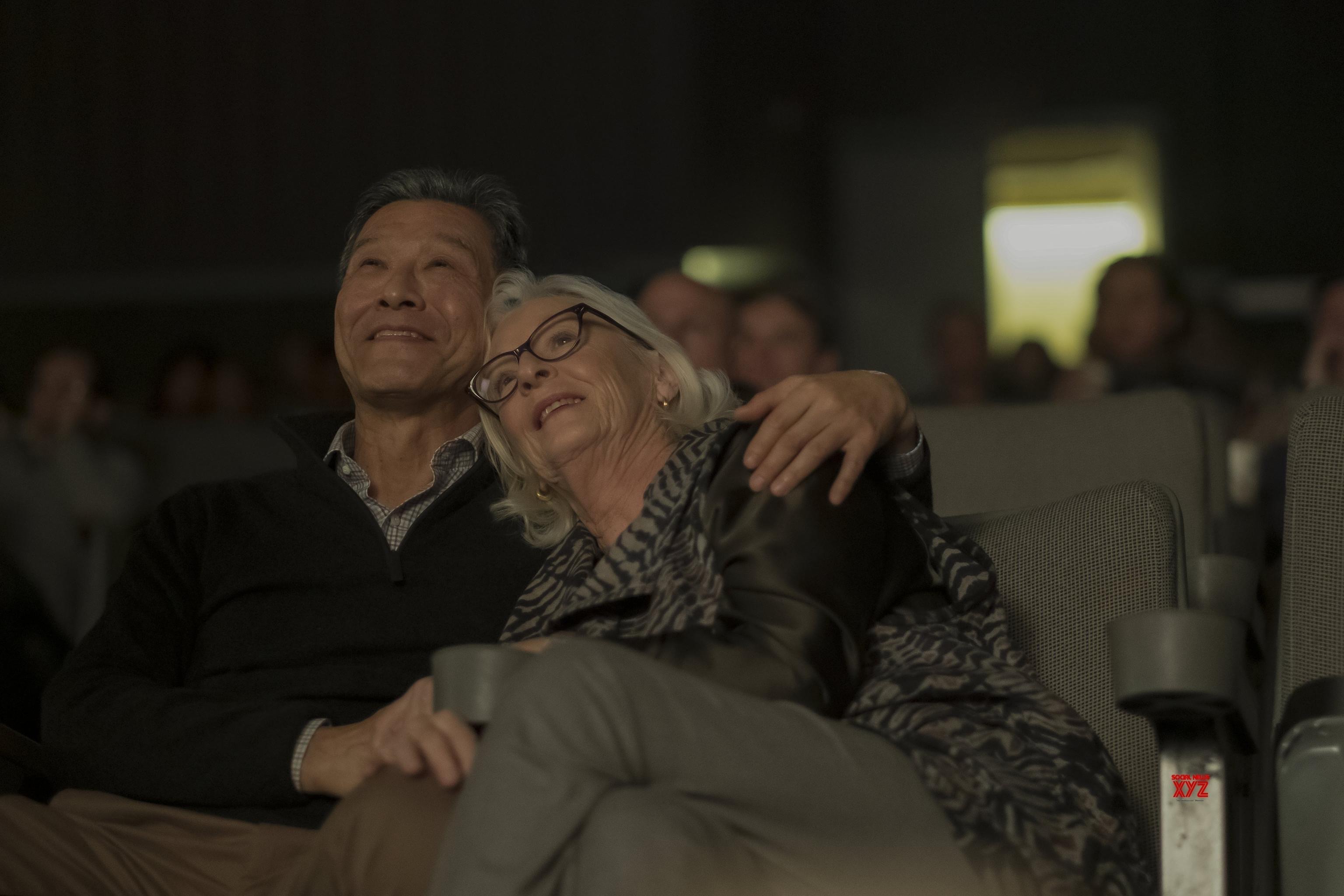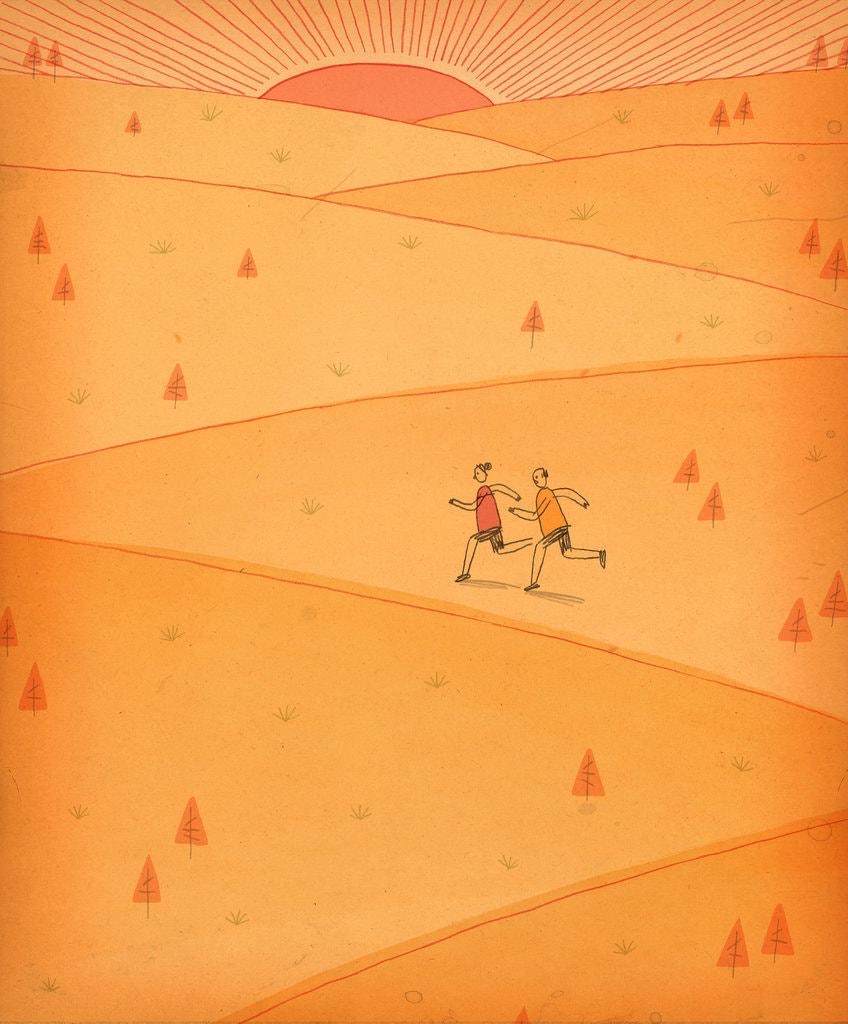多人英文轮本,该系列Part 2,选自《纽约时报》Modern Love专栏英文故事,同名美剧(豆瓣8.8分)取材。
5个bgm分别对应5个故事,配合bgm效果更佳。
目录
1. The Race Grows Sweeter Near Its Final Lap
2. You May Want to Marry My Husband
3. My Wife Said You May Want to Marry Me (2与3联动)
4. To Fall in Love With Anyone, Do This
5. She Wanted a Man With a Good Job Who Is Nice to Animals
(禁止转载,如有侵权,请联系作者处理)
1. The Race Grows Sweeter Near Its Final Lap
By Eve Pell
Sam and I dated for two years. Then, when I turned 70 and he 80, we had a joint 150th birthday party and announced our engagement. We married a year later.
We came from very different backgrounds. Sam, a Japanese-American who had been interned in the camps during World War II, worked his way through college and was happily married to his Japanese-American wife for more than 40 years until her death. I grew up as a fox-hunting debutante ['dɛbjutɑnt] whose colonial New York ancestors were lords of the manor of Pelham ['peləm]. Typical of my much-married family, I had been divorced twice.
We belonged to the same San Francisco-area running club. He was a rarity - a charming, fit, single man of 77. I wanted to get to know him better.
I devised a plan. Our mutual friend Janet had in her house a small movie theater that seated about a dozen people; she often had parties there. I called her. “This is very seventh grade,” I began. “But I’d like you to invite Sam to one of your screenings. I’ll come to any movie he’s coming to.”
Soon after, she called. “He’s coming on Thursday.”
There were 8 or 10 of us there that evening. After the movie, as we were all standing around and chatting, someone mentioned “The Motorcycle Diaries,” a new film about Che Guevara [tʃeɪ ɡəˈvɑːrə].
“I’d like to see that,” I said.
“I would too,” Sam said. Short pause. I held my breath. He looked at me. “Would you like to go?”
Squelching [skwɛltʃ] the urge to high-five Janet, I said yes. We set a date for the following week; he’d meet me at the theater. But when the day came, our movie was sold out.
What to do? We looked at what else was playing and chose “Sideways.” I have only a vague memory of some plot about men and wine, but a sharp memory of sitting next to Sam. And when “Sideways” was over, we decided that since we hadn’t met our objective, we’d see “The Motorcycle Diaries” another day.
Sam and I began running together. Early on, however, I was faced with a dilemma. At a half-marathon in Humboldt ['hʌmbəult] County, he went out fast and was way ahead. But as the miles went by, I crept closer and closer and I could see, from the way he was running, that I had more energy left. What to do? Should I beat him and risk his being resentful? Some men really hate being bested by a woman.
I could slow down and let him beat me, but that would be patronizing to him and make me resentful. Then I thought, “If he gets annoyed that I ran faster, he’s not the man for me.” So I sped up, patted him on the behind, and said, “Come on!” I ran on to the finish and, as it happened, he couldn’t keep up. But I needn’t have worried. Sam didn’t get upset - in fact, he seemed pleased I had run well. And so we grew together.
Sam and I often ate at Chinese restaurants where I received some fortune cookies that truly lived up to their name. Two of my favorites:
“Persevere with your plans and you will marry your love.”
“Stop searching forever. Happiness is just next to you.”
One evening at the movies, after we had been seeing each other for several weeks, I felt his hand on mine. If I close my eyes and concentrate, I can recapture the moment: the dark of the theater, the warmth of his hand, my happiness. One might not expect an old grandmother to feel a surge of romance, but I did, and I knew that his reaching out was a brave gesture. I reciprocated [rɪ'sɪprəket], inviting him in for tea when he took me home. I have a narrow, uncomfortable sofa in my living room, poorly designed for intimacy, but nevertheless that was where we sat, and that was where we kissed before he went home.
There was a complication: I could feel that Sam was conflicted about our budding relationship because of his loyalty to his wife, Betty, who had died six years before. In my younger years I would have felt competitive, as if his love for her meant less for me. Now I knew differently, and one night I spoke my mind.
“I know that you loved Betty very much, and I have great respect for your marriage,” I began. “But I think you have room in your heart for me, too.”
He hugged me and went home.
Several days later he asked, “Are you going to run the 5K in Carmel ['kɑ:mel] next week?”
“Yes.”
“Would you like to go together?”
“Yes.” I had no idea what he had in mind, but that became clear a few days later. We were talking after a run; Sam looked bashfully down at his shoes as he said:
“I have made a reservation in Carmel for a room with one bed. Is that O.K.?”
I realized that the last time he had been dating was in the early 1950s, before his marriage, and he had entirely missed the change in customs of the ’60s and ’70s. When he began staying over at my house, he always stopped the newspaper at his house so the neighbors wouldn’t know what was going on. But for all his adherence to decorum, he was a true romantic.
A few months later, when we were both in Europe on separate trips, we met in Barcelona. This was a leap. Traveling together in a foreign country would be a more exacting test of our relationship than our jaunts to movies and races. But in this, as in almost everything else, Sam was perfect. When I arrived at our hotel, he was there with wine, chocolates and flowers. For all our anxiety about traveling together, we meshed. On the flight home, Sam declared, “We must never travel separately again.”
From then on, we were well and truly together. We had few outside pressures: He was retired with a comfortable pension; I was a freelance writer with an outside income; our middle-aged children were on their own. We had nothing to do but love each other and be happy. Sam and I did things younger people do - we ran and raced, we fell in love and traveled and remodeled a house and got married.
After the ceremony, we flew to Hawaii. “You must never call this a honeymoon,” he told me.
“That way no one can ever say that the honeymoon is over.”
We traveled to Italy to compete in the 2007 World Masters Athletics Championships (what I fondly call “The Geriatric ['dʒɛrɪ'ætrɪk] Olympics”), where we both won gold medals in our respective age brackets: 70 to 74 for me and 80 to 84 for Sam. At home, we planted a garden; I finished writing a memoir. Every morning we did push-ups; every evening we sat on the rim of our bathtub and flossed our teeth. He called me “sweetheart.” He never forgot an anniversary, including our first movie date. I gave him flowers on Betty’s birthday.
OLD LOVE is different. In our 70s and 80s, we had been through enough of life’s ups and downs to know who we were, and we had learned to compromise. We knew something about death because we had seen loved ones die. The finish line was drawing closer. Why not have one last blossoming of the heart?
I was no longer so pretty, but I was not so neurotic either. I had survived loss and mistakes and ill-considered decisions; if this relationship failed, I’d survive that too. And unlike other men I’d been with, Sam was a grown-up, unafraid of intimacy, who joyfully explored what life had to offer. We followed our hearts and gambled, and for a few years we had a bit of heaven on earth.
Then one day the tear duct in Sam’s right eye didn’t work, and soon his eye began to bulge. One misdiagnosis and failed treatment followed another until there was a biopsy ['baɪɑpsi]. A week later his doctor called to say Sam had stage 4 cancer that he would not survive.
There was the agony of Sam’s fight to live, which he waged with grace and courage. Desperate to lessen his suffering, I learned to give hospital nurses $20 Starbucks cards to get special care for him. Every day I brought him bowls of his favorite watermelon balls. But one morning he couldn’t even eat those, and a few hours later he died.
Not only was I happy during my short years with Sam, I knew I was happy. I had one of the most precious blessings available to human beings - real love. I went for it and found it.
I yearn desperately for Sam. But the current pain is very worth it. He and I often told each other, “We are so lucky.” And we were. Young love, even for old people, can be surprisingly bountiful.
2. You May Want to Marry My Husband
By Amy Krouse Rosenthal
I have been trying to write this for a while, but the morphine and lack of juicy cheeseburgers (what has it been now, five weeks without real food?) have drained my energy and interfered with whatever prose prowess remains. Additionally, the intermittent micronaps that keep whisking me away midsentence are clearly not propelling my work forward as quickly as I would like. But they are, admittedly, a bit of trippy fun.
Still, I have to stick with it, because I’m facing a deadline, in this case, a pressing one. I need to say this (and say it right) while I have a) your attention, and b) a pulse.
I have been married to the most extraordinary man for 26 years. I was planning on at least another 26 together.
Want to hear a sick joke? A husband and wife walk into the emergency room in the late evening on Sept. 5, 2015. A few hours and tests later, the doctor clarifies that the unusual pain the wife is feeling on her right side isn’t the no-biggie appendicitis [əˌpɛndəˈsaɪtəs] they suspected but rather ovarian [o'vɛrɪən] cancer.
As the couple head home in the early morning of Sept. 6, somehow through the foggy shock of it all, they make the connection that today, the day they learned what had been festering, is also the day they would have officially kicked off their empty-nestering. The youngest of their three children had just left for college.
So many plans instantly went poof.
No trip with my husband and parents to South Africa. No reason, now, to apply for the Harvard Loeb Fellowship. No dream tour of Asia with my mother. No writers’ residencies at those wonderful schools in India, Vancouver [vænˈkuːvɚ], Jakarta [ʤəˈkɑɚtə].
No wonder the word cancer and cancel look so similar.
This is when we entered what I came to think of as Plan “Be,” existing only in the present. As for the future, allow me to introduce you to the gentleman of this article, Jason Brian Rosenthal.
He is an easy man to fall in love with. I did it in one day.
Let me explain: My father’s best friend since summer camp, “Uncle” John, had known Jason and me separately our whole lives, but Jason and I had never met. I went to college out east and took my first job in California. When I moved back home to Chicago, John — who thought Jason and I were perfect for each other — set us up on a blind date.
It was 1989. We were only 24. I had precisely zero expectations about this going anywhere. But when he knocked on the door of my little frame house, I thought, “Uh-oh, there is something highly likable about this person.”
By the end of dinner, I knew I wanted to marry him.
Jason? He knew a year later.
I have never been on Tinder, Bumble or eHarmony, but I’m going to create a general profile for Jason right here, based on my experience of coexisting in the same house with him for, like, 9,490 days.
First, the basics: He is 5-foot-10, 160 pounds, with salt-and-pepper hair and hazel eyes.
The following list of attributes is in no particular order because everything feels important to me in some way.
He is a sharp dresser. Our young adult sons, Justin and Miles, often borrow his clothes. Those who know him — or just happen to glance down at the gap between his dress slacks and dress shoes — know that he has a flair for fabulous socks. He is fit and enjoys keeping in shape.
If our home could speak, it would add that Jason is uncannily handy. On the subject of food — man, can he cook. After a long day, there is no sweeter joy than seeing him walk in the door, plop a grocery bag down on the counter, and woo me with olives and some yummy cheese he has procured before he gets to work on the evening’s meal.
Jason loves listening to live music; it’s our favorite thing to do together. I should also add that our 19-year-old daughter, Paris, would rather go to a concert with him than anyone else.
When I was working on my first memoir, I kept circling sections my editor wanted me to expand upon. She would say, “I’d like to see more of this character.”
Of course, I would agree — he was indeed a captivating character. But it was funny because she could have just said: “Jason. Let’s add more about Jason.”
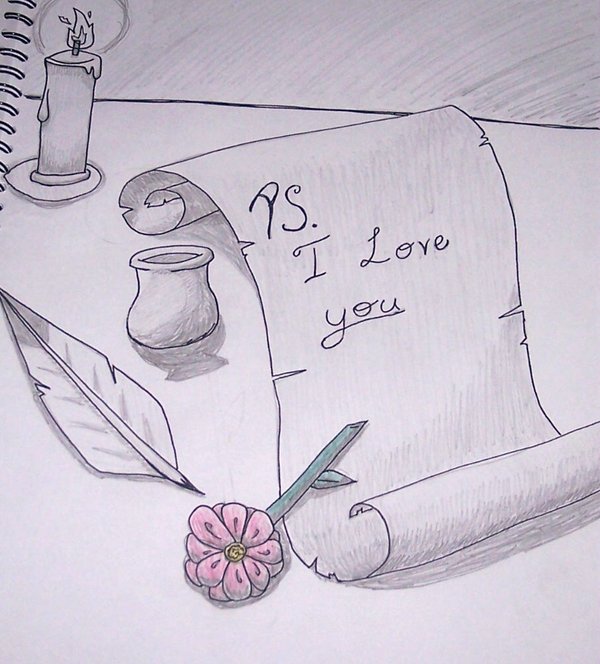
He is an absolutely wonderful father. Ask anyone. See that guy on the corner? Go ahead and ask him; he’ll tell you. Jason is compassionate — and he can flip a pancake.
Jason paints. I love his artwork. I would call him an artist except for the law degree that keeps him at his downtown office most days from 9 to 5. Or at least it did before I got sick.
If you’re looking for a dreamy, let’s-go-for-it travel companion, Jason is your man. He also has an affinity for tiny things: taster spoons, little jars, a mini-sculpture of a couple sitting on a bench, which he presented to me as a reminder of how our family began.
Here is the kind of man Jason is: He showed up at our first pregnancy ultrasound with flowers. This is a man who, because he is always up early, surprises me every Sunday morning by making some kind of oddball smiley face out of items near the coffeepot: a spoon, a mug, a banana.
This is a man who emerges from the minimart or gas station and says, “Give me your palm.” And, voilà, a colorful gumball appears. (He knows I love all the flavors but white.)
My guess is you know enough about him now. So let’s swipe right.
Wait. Did I mention that he is incredibly handsome? I’m going to miss looking at that face of his.
If he sounds like a prince and our relationship seems like a fairy tale, it’s not too far off, except for all of the regular stuff that comes from two and a half decades of playing house together. And the part about me getting cancer. Blech.
In my most recent memoir (written entirely before my diagnosis), I invited readers to send in suggestions for matching tattoos, the idea being that author and reader would be bonded by ink.
I was totally serious about this and encouraged submitters to be serious as well. Hundreds poured in. A few weeks after publication in August, I heard from a 62-year-old librarian in Milwaukee [mɪlˈwɑːki] named Paulette [pɔ:'let].
She suggested the word “more.” This was based on an essay in the book where I mention that “more” was my first spoken word (true). And now it may very well be my last (time shall tell).
In September, Paulette drove down to meet me at a Chicago tattoo parlor. She got hers (her very first) on her left wrist. I got mine on the underside of my left forearm, in my daughter’s handwriting. This was my second tattoo; the first is a small, lowercase “j” that has been on my ankle for 25 years. You can probably guess what it stands for. Jason has one too, but with more letters: “AKR.”
I want more time with Jason. I want more time with my children. I want more time sipping martinis at the Green Mill Jazz Club on Thursday nights. But that is not going to happen. I probably have only a few days left being a person on this planet. So why I am doing this?
I am wrapping this up on Valentine’s Day, and the most genuine, non-vase-oriented gift I can hope for is that the right person reads this, finds Jason, and another love story begins.
I’ll leave this intentional empty space below as a way of giving you two the fresh start you deserve.
With all my love, Amy
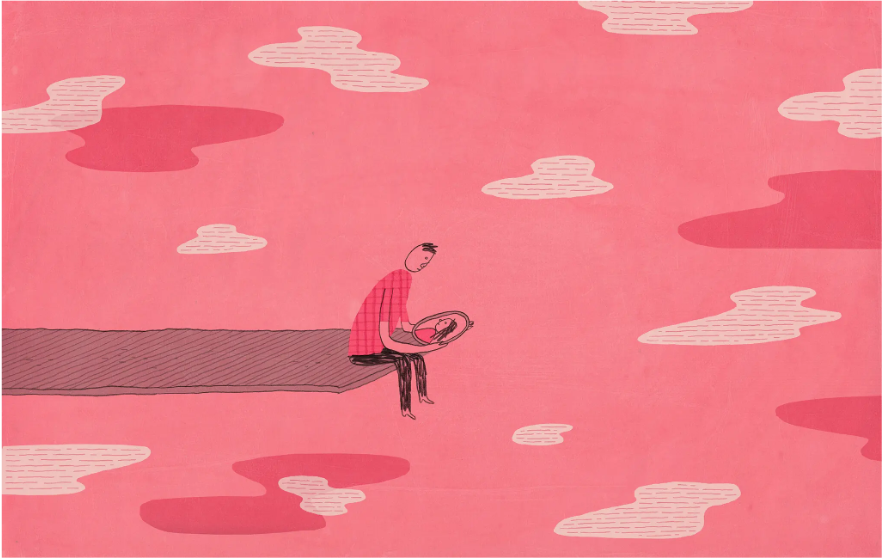
3. My Wife Said You May Want to Marry Me
By Jason B. Rosenthal
I am that guy.
A little over a year ago, my wife, Amy Krouse Rosenthal ['rəuzənta:l], published a Modern Love essay called “You May Want to Marry My Husband.” At 51, Amy was dying from ovarian cancer. She wrote her essay in the form of a personal ad. It was more like a love letter to me. Those words would be the final ones Amy published. She died 10 days later.
Amy couldn’t have known that her essay would afford me an opportunity to fill this same column with words of my own for Father’s Day, telling you what has happened since. I don’t pretend to have Amy’s extraordinary gift with words and wordplay, but here goes.
During our life together, Amy was a prolific writer, publishing children’s books, memoirs and articles. Knowing she had only a short time to live, she wanted to finish one last project. We were engaged then in home hospice, a seemingly beautiful way to deal with the end of life, where you care for your loved one in familiar surroundings, away from the hospital with its beeping machines and frequent disruptions.
I was posted up at the dining room table overlooking our living room, where Amy had established her workstation. From her spot on the couch, she worked away between micro-naps.
These brief moments of peace were induced by the morphine needed to control her symptoms. A tumor had created a complete bowel ['baʊəl] obstruction, making it impossible for her to eat solid food. She would flutter away on the keyboard, doze for a bit, then awake and repeat.
When Amy finished her essay, she gave it to me to read, as she had done with all of her writing. But this time was different. In her memoirs she had written about the children and me, but not like this. How was she able to combine such feelings of unbearable sadness, ironic humor and total honesty?
When the essay was published, Amy was too sick to appreciate it. As the international reaction became overwhelming, I was torn up thinking how she was missing the profound impact her words were having. The reach of Amy’s article — and of her greater body of work — was so much deeper and richer than I knew.
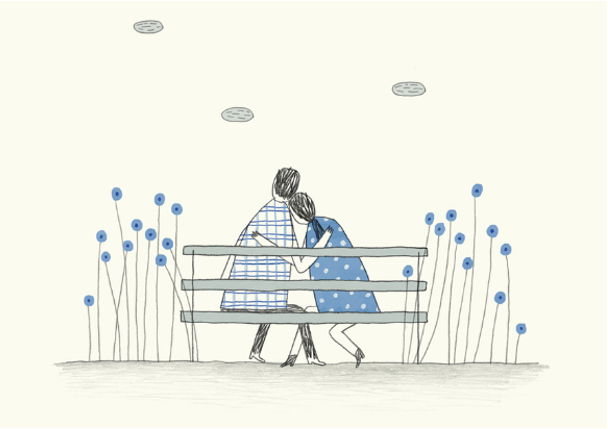
Letters poured in from around the world. They included notes of admiration, medical advice, commiseration [kəˌmɪzəˈreʃən] and offers from women to meet me. I was too consumed with grief during Amy’s final days to engage with the responses. It was strange having any attention directed at me right then, but the outpouring did make me appreciate the significance of her work.
When people ask me to describe myself, I always start with “dad,” yet I spent a great deal of my adult life being known as “Amy’s husband.” People knew of Amy and her writing, while I had lived in relative anonymity ['ænə'nɪməti]. I had no social media presence and my profession, a lawyer, did not cast me into public view.
After Amy died, I faced countless decisions in my new role as a single father. As in any marriage or union of two people with children, we had a natural division of labor. Not anymore. People often assumed Amy was disorganized because she had list upon list: scattered Post-it notes, scraps of paper and even messages scrawled on her hand. But she was one of the most organized people I have ever met.
There are aspects of everyday life I have taken on that I never gave much consideration to in the past. How did Amy hold everything together so seamlessly? I am capable of doing many things on my own, but two people can accomplish so much more together and also support each other through life’s ups and downs.
Many women took Amy up on her offer, sending me a range of messages — overly forward, funny, wise, moving, sincere. In a six-page handwritten letter, one woman marketed her automotive knowledge, apparently in an effort to woo me: “I do know how to check the radiator in the vehicle to see if it may need a tad of water before the engine blows up.”
While I do not know much about reality TV, there was also this touching letter submitted by the child of a single mother, who wrote: “I’d like to submit an application for my mom, like friends and family can do for participants on ‘The Bachelor.’”
And I appreciated the sentiment and style of the woman who wrote this: “I have this image of queues of hopeful women at the Green Mill Jazz Club on Thursday nights. Single mothers, elegant divorcées, spinster aunts, bored housewives, daughters, wilting violets … all in anxious anticipation as to whether the shoe will fit, fit them alone, that the prince from the fairy tale is meant for them. That they are the right person.”
I couldn’t digest any of these messages at the time, but I have since found solace and even laughter in many of them. One thing I have come to understand, though, is what a gift Amy gave me by emphasizing that I had a long life to fill with joy, happiness and love. Her edict to fill my own empty space with a new story has given me permission to make the most out of my remaining time on this planet.
If I can convey a message I have learned from this bestowal [bi'stəuəl], it would be this: Talk with your mate, your children and other loved ones about what you want for them when you are gone. By doing this, you give them liberty to live a full life and eventually find meaning again. There will be so much pain, and they will think of you daily. But they will carry on and make a new future, knowing you gave them permission and even encouragement to do so.
I want more time with Amy. I want more time picnicking and listening to music at Millennium Park. I want more Shabbat dinners with the five of us Rosies (as we Rosenthals are referred to by our family).
I would even gladly put up with Amy taking as much time as she wants to say goodbye to everyone at our family gatherings, as she always used to do, even after we had been there for hours, had a long drive home ahead of us and likely would see them again in a few days.
I wish I had more of all of those things, just as Amy had wished for more. But more wasn’t going to happen for her or us. Instead, as she described, we followed Plan “Be,” which was about being present in our lives because time was running short. So we did our best to live in the moment until we had no more moments left.
The cruelest irony of my life is that it took me losing my best friend, my wife of 26 years and the mother of my three children, to truly appreciate each and every day. I know that sounds like a cliché, and it is, but it’s true.
Amy continues to open doors for me, to affect my choices, to send me off into the world to make the most of it. Recently I gave a TED Talk on the end of life and my grieving process that I hope will help others — not something I ever pictured myself doing, but I’m grateful for the chance to connect with people in a similar position. And of course I am writing to you now only because of her.
I am now aware, in a way I wish I never had to learn, that loss is loss is loss, whether it’s a divorce, losing a job, having a beloved pet die or enduring the death of a family member. In that respect, I am no different. But my wife gave me a gift at the end of her column when she left me that empty space, one I would like to offer you. A blank space to fill. The freedom and permission to write your own story. Here is your empty space. What will you do with your own fresh start?
Humbly, Jason
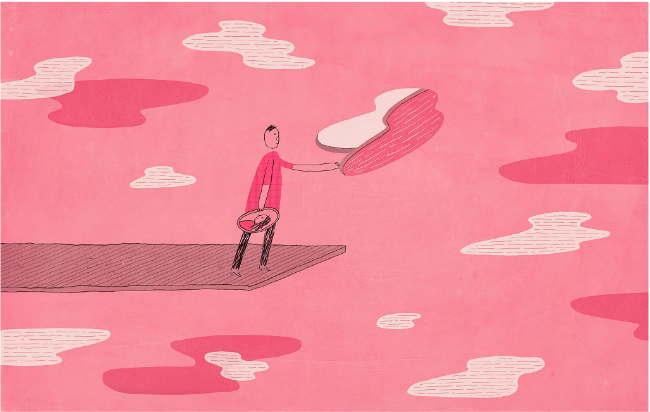
4. To Fall in Love With Anyone, Do This
By Mandy Len Catron
More than 20 years ago, the psychologist Arthur Aron succeeded in making two strangers fall in love in his laboratory. Last summer, I applied his technique in my own life, which is how I found myself standing on a bridge at midnight, staring into a man’s eyes for exactly four minutes.
Let me explain. Earlier in the evening, that man had said, “I suspect, given a few commonalities, you could fall in love with anyone. If so, how do you choose someone?”
He was a university acquaintance I occasionally ran into at the climbing gym and had thought, “What if?” I had gotten a glimpse into his days on Instagram. But this was the first time we had hung out one-on-one.
“Actually, psychologists have tried making people fall in love,” I said, remembering Dr. Aron’s study. “It’s fascinating. I’ve always wanted to try it.”
I first read about the study when I was in the midst of a breakup. Each time I thought of leaving, my heart overruled my brain. I felt stuck. So, like a good academic, I turned to science, hoping there was a way to love smarter.
I explained the study to my university acquaintance. A heterosexual [hɛtərə'sɛkʃuəl] man and woman enter the lab through separate doors. They sit face to face and answer a series of increasingly personal questions. Then they stare silently into each other’s eyes for four minutes. The most tantalizing detail: Six months later, two participants were married. They invited the entire lab to the ceremony.
“Let’s try it,” he said.
Let me acknowledge the ways our experiment already fails to line up with the study. First, we were in a bar, not a lab. Second, we weren’t strangers. Not only that, but I see now that one neither suggests nor agrees to try an experiment designed to create romantic love if one isn’t open to this happening.
I Googled Dr. Aron’s questions; there are 36. We spent the next two hours passing my iPhone across the table, alternately posing each question.
They began innocuously [ɪ'nɑkjʊəsli]: “Would you like to be famous? In what way?” And “When did you last sing to yourself? To someone else?”
But they quickly became probing.
In response to the prompt, “Name three things you and your partner appear to have in common,” he looked at me and said, “I think we’re both interested in each other.”
I grinned and gulped my beer as he listed two more commonalities I then promptly forgot. We exchanged stories about the last time we each cried, and confessed the one thing we’d like to ask a fortuneteller. We explained our relationships with our mothers.
The questions reminded me of the infamous boiling frog experiment in which the frog doesn’t feel the water getting hotter until it’s too late. With us, because the level of vulnerability increased gradually, I didn’t notice we had entered intimate territory until we were already there, a process that can typically take weeks or months.
I liked learning about myself through my answers, but I liked learning things about him even more. The bar, which was empty when we arrived, had filled up by the time we paused for a bathroom break.
I sat alone at our table, aware of my surroundings for the first time in an hour, and wondered if anyone had been listening to our conversation. If they had, I hadn’t noticed. And I didn’t notice as the crowd thinned and the night got late.
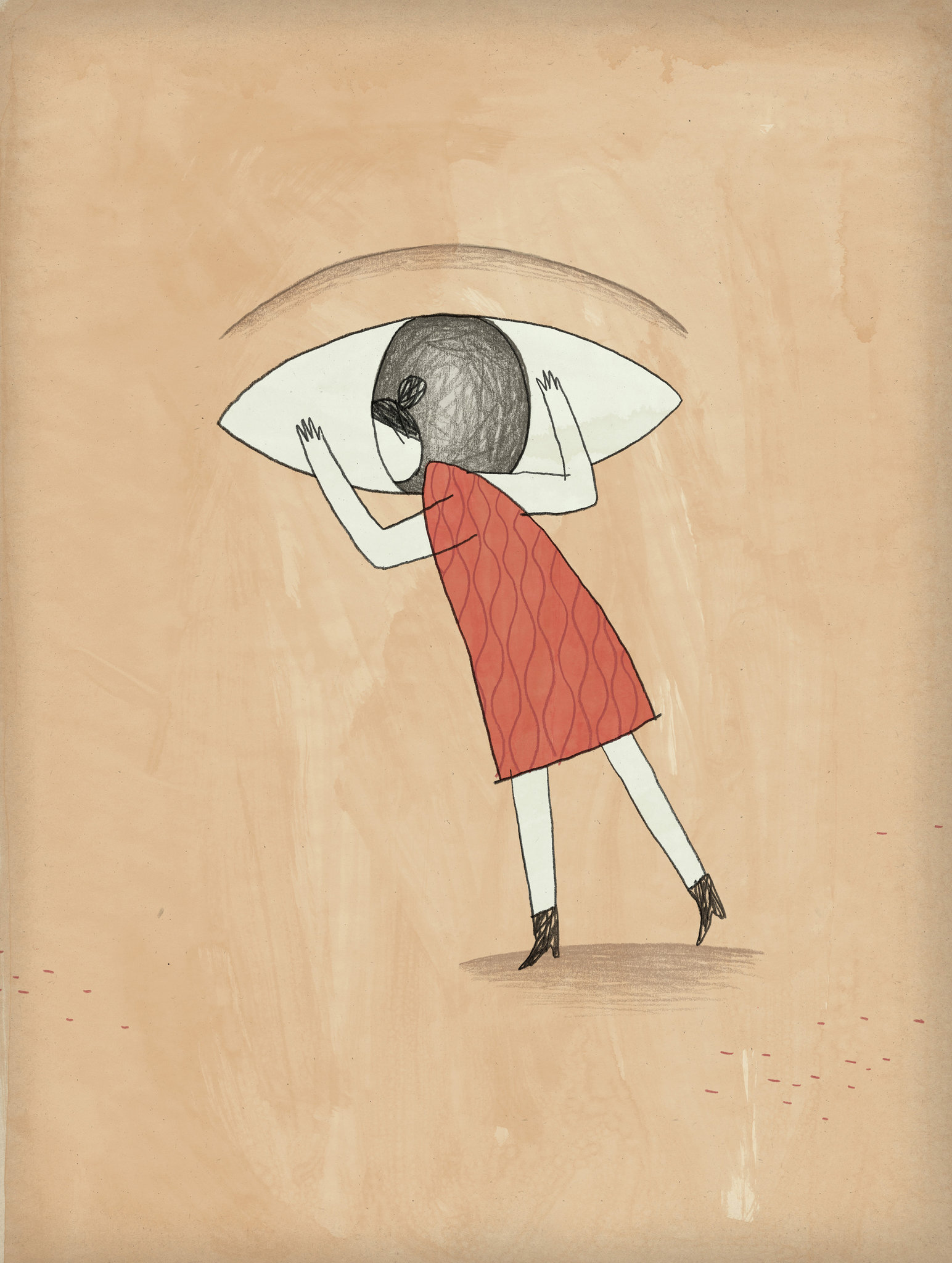
We all have a narrative of ourselves that we offer up to strangers and acquaintances, but Dr. Aron’s questions make it impossible to rely on that narrative. Ours was the kind of accelerated intimacy I remembered from summer camp, staying up all night with a new friend, exchanging the details of our short lives. At 13, away from home for the first time, it felt natural to get to know someone quickly. But rarely does adult life present us with such circumstances.
The moments I found most uncomfortable were not when I had to make confessions about myself, but had to venture opinions about my partner. For example: “Alternate sharing something you consider a positive characteristic of your partner, a total of five items” (Question 22), and “Tell your partner what you like about them; be very honest this time saying things you might not say to someone you’ve just met” (Question 28).
Much of Dr. Aron’s research focuses on creating interpersonal closeness. In particular, several studies investigate the ways we incorporate others into our sense of self. It’s easy to see how the questions encourage what they call “self-expansion.” Saying things like, “I like your voice, your taste in beer, the way all your friends seem to admire you,” makes certain positive qualities belonging to one person explicitly valuable to the other.
It’s astounding, really, to hear what someone admires in you. I don’t know why we don’t go around thoughtfully complimenting one another all the time.
We finished at midnight, taking far longer than the 90 minutes for the original study. Looking around the bar, I felt as if I had just woken up. “That wasn’t so bad,” I said. “Definitely less uncomfortable than the staring into each other’s eyes part would be.”
He hesitated and asked. “Do you think we should do that, too?”
“Here?” I looked around the bar. It seemed too weird, too public.
“We could stand on the bridge,” he said, turning toward the window.
The night was warm and I was wide-awake. We walked to the highest point, then turned to face each other. I fumbled with my phone as I set the timer.
“O.K.,” I said, inhaling sharply.
“O.K.,” he said, smiling.
I’ve skied steep slopes and hung from a rock face by a short length of rope, but staring into someone’s eyes for four silent minutes was one of the more thrilling and terrifying experiences of my life. I spent the first couple of minutes just trying to breathe properly. There was a lot of nervous smiling until, eventually, we settled in.
I know the eyes are the windows to the soul or whatever, but the real crux of the moment was not just that I was really seeing someone, but that I was seeing someone really seeing me. Once I embraced the terror of this realization and gave it time to subside, I arrived somewhere unexpected.
I felt brave, and in a state of wonder. Part of that wonder was at my own vulnerability and part was the weird kind of wonder you get from saying a word over and over until it loses its meaning and becomes what it actually is: an assemblage [ə'sɛmblɪdʒ] of sounds.
So it was with the eye, which is not a window to anything but rather a clump of very useful cells. The sentiment associated with the eye fell away and I was struck by its astounding biological reality: the spherical nature of the eyeball, the visible musculature ['mʌskjələtʃɚ] of the iris and the smooth wet glass of the cornea. It was strange and exquisite.
When the timer buzzed, I was surprised — and a little relieved. But I also felt a sense of loss. Already I was beginning to see our evening through the surreal and unreliable lens of retrospect.
Most of us think about love as something that happens to us. We fall. We get crushed.
But what I like about this study is how it assumes that love is an action. It assumes that what matters to my partner matters to me because we have at least three things in common, because we have close relationships with our mothers, and because he let me look at him.
I wondered what would come of our interaction. If nothing else, I thought it would make a good story. But I see now that the story isn’t about us; it’s about what it means to bother to know someone, which is really a story about what it means to be known.
It’s true you can’t choose who loves you, although I’ve spent years hoping otherwise, and you can’t create romantic feelings based on convenience alone. Science tells us biology matters; our pheromones and hormones do a lot of work behind the scenes.
But despite all this, I’ve begun to think love is a more pliable thing than we make it out to be. Arthur Aron’s study taught me that it’s possible — simple, even — to generate trust and intimacy, the feelings love needs to thrive.
You’re probably wondering if he and I fell in love. Well, we did. Although it’s hard to credit the study entirely (it may have happened anyway), the study did give us a way into a relationship that feels deliberate. We spent weeks in the intimate space we created that night, waiting to see what it could become.
Love didn’t happen to us. We’re in love because we each made the choice to be.
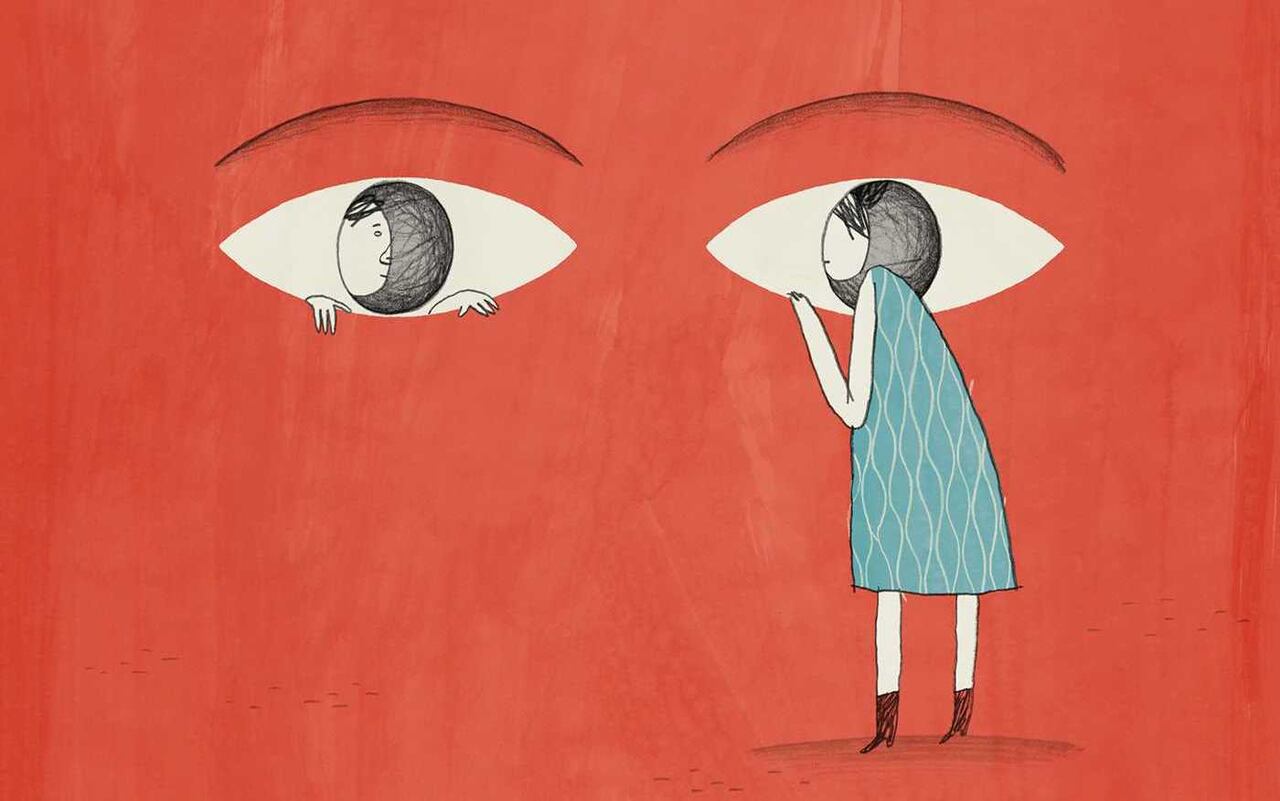
5. She Wanted a Man With a Good Job Who Is Nice to Animals
By Timothy Braun
“Stay here and guard the castle,” I would say to my dog, Dusty, every time I left our condo. Over the years, his eyes — one blue, one brown — had become washed with gray, his sight was failing, and his hips were becoming tight. He was hardly a guard dog.
When I came home, he no longer greeted me at the door but would raise his nose in welcome. I gave him peanut butter for his bravery, sometimes with painkillers to help with his hips.
Eleven years earlier, I adopted Dusty-Danger Dog (his full name) from the Town Lake Animal Shelter in Austin. I stopped by the shelter one day, came back the next, and Dusty was the only dog who remembered me. He had pointy ears like a giant fox and was at risk of being euthanized [ˈjuθəˌnaɪz].
Since then, he and I traveled the country in my bumper-stickered Toyota pickup, visiting 28 states while putting 290,000 miles on that truck. During our years in Austin, Dusty became a local legend, helping to raise thousands of dollars for nonprofit organizations such as Austin Bat Cave and the Fusebox Festival. For a monetary donation to the nonprofit, Dusty and I would take someone’s dog on a special date, and I would write an essay about it for the donor. This raised a surprisingly large amount of money.
For this, Austin’s mayor proclaimed August 17 (this very weekend!) “Dusty-Danger Dog Day,” citing Dusty’s “meaningful contributions to the city and people of Austin with volunteerism, fund-raising and four-legged ambassadorship for the arts, environment, education and health.”
On a personal level, Dusty became the manager of my life. He got me up in the morning with a lick to my face. When he ate, I ate. In the middle of the day, he forced me to turn off my computer and go for a walk.
I enjoyed the sun on my face and the smell of wildflowers. We shared sandwiches and pizza and watched comic-book movies together. Dusty never cared if I changed my clothes. I would read to him from my favorite book, “The Little Prince,” lines like: “You are responsible, forever, for what you have tamed.”
I had those words tattooed to my arm.
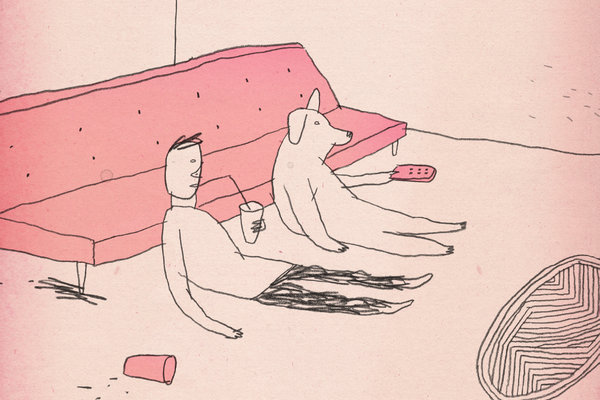
Dusty taught me everything I needed to know about life, but over the years there had been something missing. My friends Ben and Rachel insisted I join a dating app to expand my horizons. That’s how they met, but I loathed the idea.
Why would I want to expand my life? I had a dog, a place to live, a pickup truck smothered in bumper stickers. But out of curiosity (or God knows what), I humored them. I created a Tinder account with a picture of Dusty as my profile picture. No one matched with me until Rachel explained that I was swiping in the wrong direction. The first time I swiped right, I matched.
On my date with Ilse ['ilsə], we had salad and calamari. She was shy, lovely and, as a person with diabetes [daɪə'bitiz], checked her blood sugar when food came. On our second date, we drank wine, bowled at a speakeasy, and talked about Dusty and her cats, Dori Ann Gray and Oscar Wilde. On our third date, Ilse held my hand and shared that she had been assaulted in New Orleans in June, years ago.
As a result, June makes her sad, and so does New Orleans, a town she loved and lost, and Dusty and I had come to love in our travels. As a landscape architect, she works with plants and water. She doesn’t like comic-book movies and watches the Hallmark Channel. She makes me eat brussels sprouts, which are surprisingly tolerable on pizza.
With Dusty everything was safe and there was never a compromise, but with Ilse I had to listen and negotiate. Ilse knew how to manage her life, and she made me change. Sometimes she made me change my clothes.
After a year of dating, Ilse began pushing for marriage, an idea that terrified me. I’m not afraid of commitment; I’m afraid of divorce, of failure. But I was also afraid of losing Ilse. She said it’s difficult for an entrepreneurial woman in her 30s to find love with someone who has a good job and is nice to animals.
We had a back and forth, like playing chess. For every argument I made for not getting married and giving up my perfect life, she had a better counter argument. She used words like “us” and “ours,” words I had previously reserved for my relationship with Dusty.
One evening, Ilse said if I wasn’t going to be with her, I had to let her go so she could find someone else. As much as I loved my dog and my perfect life, I didn’t want to lose Ilse, especially knowing I was about to lose Dusty, whose health had deteriorated [dɪ'tɪrɪəret] to the point where he could barely walk.
The next morning, I told Dusty, as usual, to stay home and guard the castle. I was driving to the University of Texas at San Antonio at 5:30 a.m. to lecture about subjectivity and causality when I was hit from behind by what I think was a drunken driver. The collision launched my truck, at 70 miles per hour, into a cement barrier, where it was ripped to pieces. The force of the impact peeled two of my bumper stickers from the tailgate ['telɡet].
If it weren’t for the airbag, I would be dead. As the paramedics [pærə'mɛdɪk] cut me from the truck, all I said was: “Take care of my dog, take care of my dog, take care of my dog.” In that moment, coughing from airbag dust, I thought none of this was worth anything unless I had something more to live for.
So I designed an elaborate, weeklong wedding proposal that included a writing class, rock climbing and a party at an urban winery. After Ilse said yes, she moved into what is now our condo, bringing her cat, Dori, who became fast friends with Dusty, napping together and sharing food.
My goal was to marry in June so Ilse could reclaim that month with a fond memory. I asked Dusty to be in my wedding party. “Maybe he can tie my tie,” I thought. Ilse and I registered for small appliances and dishes. Everything changed.
Two weeks before our wedding, Dusty caught his paw on the rug as he tried to get up from his nap with Dori. He hit the floor hard and whimpered. I held him and gave him peanut butter with painkillers. He looked at Ilse as she stacked wedding gifts in our office, and then he looked at me.
His eyes said, “It’s time.”
I took Dusty for one last walk so he could feel the sun on his nose. We had treats and watched a comic-book movie together. The vet gave him drugs. Dusty died at home, in my arms, his nose on my knee, only days before Ilse and I got married. As he closed his eyes, I whispered, “I’ll guard the castle.” We wrapped him in blankets, placed him in a basket and a white van took him away.
Within minutes I was lost, pacing the living room, looking out the window for the white van to come back, hoping the vet had made a mistake, wishing everything could return to the way it had been. Ilse asked if I wanted to hike or swim to take my mind off Dusty, but I couldn’t.
“All I ask is you smile for pictures,” Ilse said as our wedding approached. We had been taking classes for our first dance to Wilco’s “California Stars,” the song we first danced to in my kitchen, and I could hardly shuffle my feet.
When I went to pick up Dusty’s ashes at the funeral home, they also gave me wildflower seeds to plant in his name. I placed his urn in the back seat of my new car and belted it in. We drove by our favorite pizzeria [pitsəˈriə], our favorite parks, our favorite everythings in Austin, and as we drove, I thought I saw Dusty’s shape in a cloud. I knew he would always be with me.
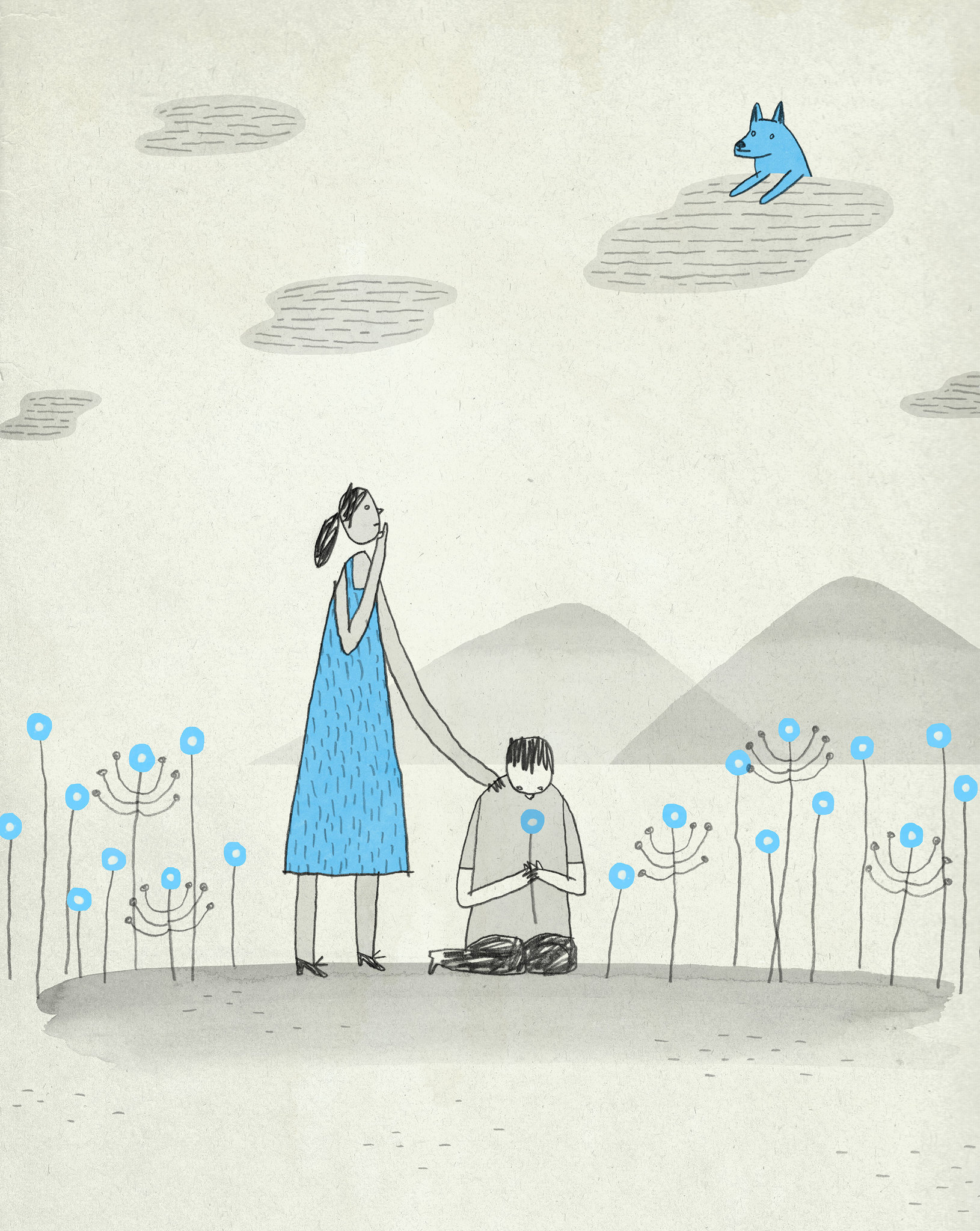
On the day of the wedding, I led a team of true believers to Town Lake, not far from where I adopted Dusty, to plant those wildflowers. I bought kazoos and we gave him a 21-kazoo salute.
Five hours later, after my groomsmen had tied my tie, Ilse and I stood before friends and family as my best man read from “The Little Prince,” ending with: “You are responsible, forever, for what you have tamed.”
I thought I had been responsible for Dusty, but really he had been responsible for me, and now he was passing the torch to Ilse, my new partner for smelling the wildflowers.
With the sun on my face, I said, “I do.”

